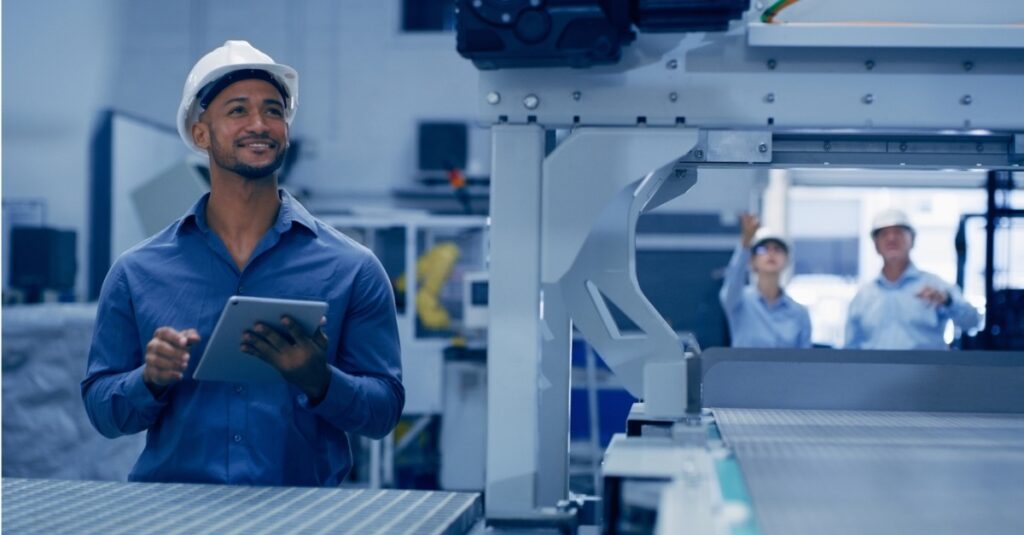
Many believe a recession is looming – with the main triggers being pandemic fall-out, war on Ukraine, and climate change. So, what should we do? Read all about it in our monthly round-up of manufacturing-related news.
Be Resilient. But Not Too Resilient.
The Economist is specialized in explaining the state of the world. And ‘The Tricky Restructuring Of Global Supply Chains – Why Too Much Resilience Is Dangerous’ is a savvy summary of the challenges global businesses are currently facing.
“Three years ago, The Economist used the term ‘slowbalization’ to describe the fragile state of international trade and commerce. After the go-go 1990s and 2000s the pace of economic integration stalled in the 2010s, as firms grappled with the aftershocks of a financial crisis, a populist revolt against open borders and President Donald Trump’s trade war. The flow of goods and capital stagnated. Many bosses postponed big decisions on investing abroad: just-in-time gave way to wait-and-see. No one knew if globalization faced a blip or extinction.”
“Now the waiting is over, as the pandemic and war in Ukraine have triggered a once-in-a-generation reimagining of global capitalism in boardrooms and governments. Everywhere you look, supply chains are being transformed, from the $9trn in inventories, stockpiled as insurance against shortages and inflation, to the fight for workers as global firms shift from China into Vietnam. This new kind of globalization is about security, not efficiency: it prioritizes doing business with people you can rely on, in countries your government is friendly with. It could descend into protectionism, big government and worsening inflation. Alternatively, if firms and politicians show restraint, it could change the world economy for the better, keeping the benefits of openness while improving resilience.”
“Will today’s governments be up to the task? Myopia and insularity abound. But if you are a consumer of global goods and ideas – that is to say, a citizen of the world – you should hope globalization’s next phase involves the maximum possible degree of openness. A new balance between efficiency and security is a reasonable goal. Living in a subsidized bunker is not.”
Reframing The Picture: Climate Change as Prime Inflation Driver
“I don’t think people have realized that climate change is an economic issue now because it’s always been seen as an environmental, health or social issue,” says Bob Keefe, author of Climatenomics, in ‘Climate Crisis Is “Battering Our Economy” And Driving Inflation, New Book Says’. “The fact of the matter is climate change is battering our economy.”
Climate change is simply too complex to breakdown the full costs. But when you do the numbers are eye-watering. Climate-related weather disasters alone cost the US economy more than $145 billion in 2021 – a jump of 50% from 2020.
“Its impact is broad and systemic, so there’s no one item in the CPI that you can say reflects climate change. We can say that grain and gas-oil costs reflect the Ukraine war but you can’t do that with climate change because it affects so many things,” says one expert.
“Sure, the pandemic and war on Ukraine are part of it, but I think this is a teachable moment that will allow people to see just how pervasive climate change is in affecting the way we live. We have framed the climate concern in extremely narrow ways – never a good idea with a complex social phenomenon or with something as all-encompassing as this.”
Keep R&D Close, And Your Customers Closer
So, enough doom and gloom… ‘What The SaaS Collapse Means For Every Leader – What Your Team Needs To Do To Get Through The Rocky Months Ahead’ offers practical advice on how to survive and thrive as a business during an economic downturn.
For instance, CFOs should switch from thinking in terms of annual budgets and more in terms of monthly forecasting. In addition, no one should be thinking about cutting back on R&D – innovation can save you. And anyway, as companies seek to cut their number of vendors to save money, you’ll want to offer them the fullest product suite possible.
And indeed, the best advice remains doubling down on customer joy. It’s time to work even harder to make them even happier – to know their needs before they do.
“One thing is certain: Companies that are resilient in terms of balance sheets, cash flows, customers, and culture are the ones that become unstoppable coming out of downturns. The next few years will be rough, and the past few years haven’t been easy either. But if you look back at past crises, you realize that the companies we all admire today were forged during the downturns of the past.”
Let’s get to work.




